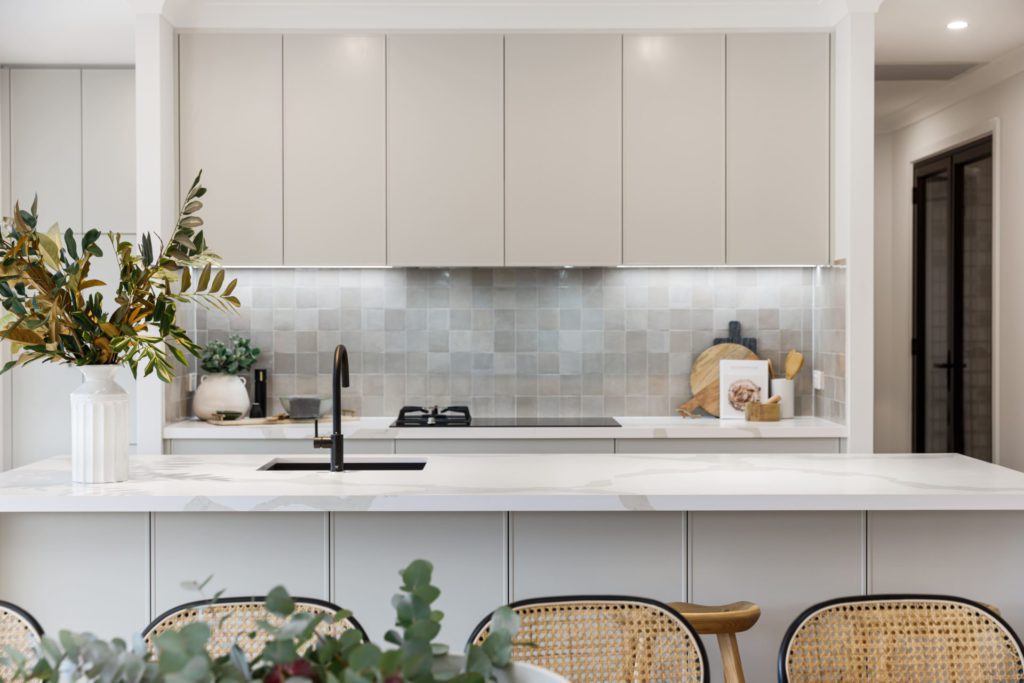Get Expert Advice on Choosing the Perfect Kitchen Benchtops for Your Vision.
Get Expert Advice on Choosing the Perfect Kitchen Benchtops for Your Vision.
Blog Article
Crucial Tips for Maintaining Your Kitchen Benchtops for Resilient Appeal
Maintaining the charm and longevity of your cooking area benchtops needs a thoughtful approach to care and cleaning. With different materials and surfaces offered, the ideal techniques might differ-- discovering these nuances might expose unforeseen understandings for your kitchen care routine.
Routine Cleaning Up Practices
Keeping an excellent kitchen benchtop starts with carrying out regular cleansing practices. Developing a constant cleaning routine is essential to avoid the accumulation of dust, crud, and microorganisms, guaranteeing both hygiene and visual appeal. A daily cleansing regimen should involve wiping down surface areas with a soft towel and cozy, soapy water to get rid of food fragments and spills. This straightforward technique not just maintains the benchtop looking fresh yet likewise lowers the threat of contamination.
Along with day-to-day upkeep, a weekly deep clean is advisable. Throughout this procedure, take into consideration making use of an extra detailed solution, such as a gentle multi-surface cleaner, to take on any type of stubborn discolorations or deposits. For products like granite or quartz, it is very important to adhere to maker recommendations for cleansing items to protect their integrity.
Pay unique interest to high-traffic areas where spills are most likely to occur, and don't neglect to clean the sides and edges where dust can gather. Normal cleaning not only boosts the longevity of your cooking area benchtop but also guarantees a safe and inviting cooking environment. By developing these practices, homeowners can maintain the appeal and functionality of their cooking area surface areas with time.
Avoiding Extreme Chemicals
When it comes to cleansing kitchen benchtops, choosing the appropriate cleaning products is paramount (Kitchen Benchtops). The long life and aesthetic appeal of your benchtops can be significantly jeopardized by the usage of rough chemicals. Lots of traditional cleaner include abrasive materials that can scrape and plain surfaces, bring about unpleasant marks and a decrease in their overall life-span
Additionally, severe chemicals can respond negatively with particular materials, such as natural rocks or engineered surfaces, possibly resulting in staining or destruction. Acidic cleansers can erode the coating of granite or marble, while bleach can harm synthetic surface areas. As a result, it is vital to select pH-balanced, mild cleaning services that successfully remove dirt and discolorations without risking injury to your benchtops.
Additionally, lots of environment-friendly products are readily available on the marketplace, which not only provide secure cleaning choices but additionally contribute to a much healthier kitchen setting. If you like a DIY approach, a combination of cozy water and moderate soap can be very effective (Kitchen Benchtops). By preventing extreme chemicals, you can maintain the elegance and integrity of your kitchen benchtops for many years to find
Using Trimming Boards
Making use of cutting boards is important for securing your kitchen benchtops from the ground up and damages while preparing food. These boards work as a barrier between your knives and the surface area of your benchtops, substantially decreasing the risk of unwanted marks and wear. It is recommended to utilize a cutting board made from products such as timber, bamboo, or plastic, as each offers distinct advantages.
Wood cutting boards are understood for their resilience and knife-friendly residential properties; they can aid maintain your blades sharp. Bamboo boards are an environmentally friendly choice that is light-weight and immune to blade scars. Plastic cutting boards, on the other hand, are easy to tidy and typically dishwasher secure, over here making them a useful option for daily usage.

Securing and Securing Surfaces
Shielding your kitchen benchtops prolongs past pop over to this site the usage of reducing boards; sealing the surface areas plays an essential duty in safeguarding against stains, moisture, and wear. The right sealer can enhance the durability of materials, such as granite, quartz, and wood, ensuring they maintain their visual charm in time.

Application of the sealant must be done in a tidy, completely dry environment, adhering to the maker's instructions for optimal outcomes. Generally, this entails cleansing the surface area completely, applying the sealer uniformly, and permitting it to treat as advised. Regular maintenance, consisting of resealing every 1-3 years depending upon usage and product, will certainly strengthen defense and prolong the life of your benchtops, ensuring they continue to be a sensational focal point in your kitchen.
Dealing With Spots Promptly
Stains on kitchen benchtops can rapidly come to be a substantial concern if not resolved immediately. The longer a tarnish remains, the much more hard it ends up being to remove, possibly causing irreversible staining and damage to the surface area. It is necessary special info to take on spills and discolorations as soon as they take place.
Various products need specific approaches to discolor removal. For circumstances, non-porous surface areas like quartz can usually be cleansed with moderate soap and water, while porous products, such as all-natural stone, might require customized cleaners to avoid fluid infiltration. Constantly refer to the manufacturer's standards for the very best cleansing methods.

Regular maintenance, consisting of sealing permeable surfaces, can dramatically minimize the threat of discoloration. By quickly addressing spills and understanding the specific needs of your benchtop product, you can protect the aesthetic appeal and performance of your cooking area surface areas for several years to come.
Final Thought
To conclude, maintaining the charm and capability of kitchen benchtops calls for adherence to essential cleaning techniques, evasion of severe chemicals, and making use of protective steps such as reducing boards. Normal sealing of permeable materials and punctual focus to spills and stains are important for protecting the integrity of surface areas. By applying these strategies, the durability and visual appeal of kitchen area benchtops can be dramatically improved, making certain a pristine and resilient culinary setting.
Report this page